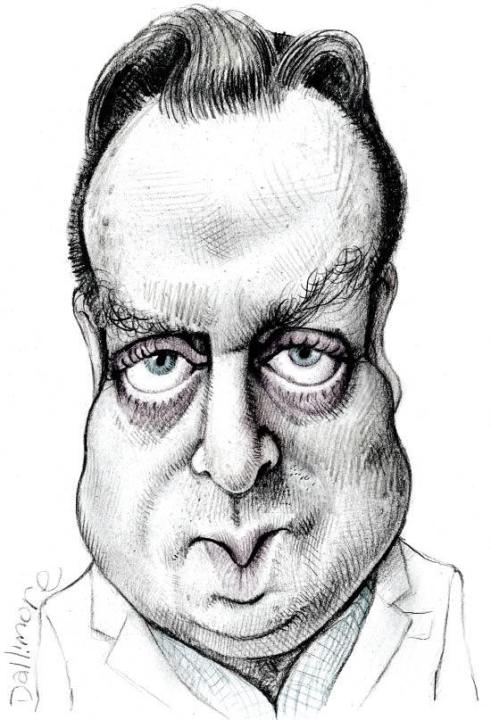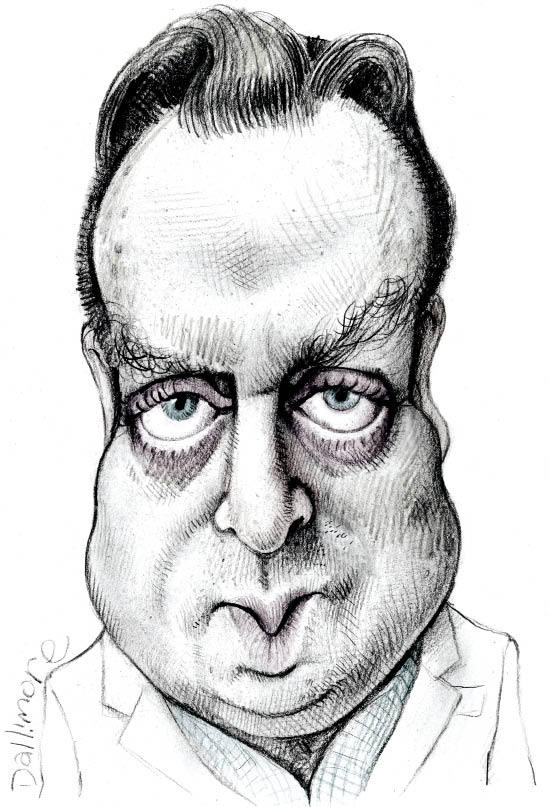
I met up with Christopher Hitchens in the smaller hours of a warm morning in May, at Heathrow airport. (This was Christopher’s idea. ‘See you at Heathrow,’ he had told me.) From Heathrow we were to drive together to Bath, where he had a speaking engagement that evening to promote his new (and great) memoir, Hitch-22. When Christopher trudged into view he looked as I knew he would look: the Hitchens-style suit; that dolphin-like face; that dirty-grey fringe. And as he stood alone in the queasy light of Arrivals he gave the impression of a raffish (and impressively bibulous) don. Christopher? ‘Ah, my dear chap. How good of you to come. Now, I must have some tea. Do you know somewhere?’ We made our way to the on-site pub. I ordered a gin and tonic. Christopher addressed himself to a Bloody Mary (‘not bad’) and a bacon sandwich (‘obscene’).
Once settled in the car, I asked Christopher about the reception his memoir had received in the UK. ‘Yeah, I know. I mean here it’s absolutely extraordinary. You can actually apply to a literary editor saying, “Look, you probably know I have a vendetta against this person — could I be the reviewer of their book?” And the editor will say “Sure! That’s fine!” It’s amazing. I mean, this guy Tibor Fischer. Now what qualifies him to be the reviewer of my memoir? I just don’t — I don’t — understand it. The magazine has to know that Tibor Fischer is a very, very declared and venomous enemy who, as far as I know, knows nothing about me. Or the subjects I write about. I was actually, I have to say, just very slightly shocked by that.’
We had not been moving for long before Christopher leant towards me and asked, with an air of mild conspiracy, whether I would care for a smoke. In an instant he had commenced formal negotiations with our driver. ‘I have a stupid question to ask you, sir. What would be your attitude to my having a cigarette?’ Silence. ‘Err. Ummm.’ ‘You must say no if it’s no.’ ‘Well, it’s not that, it’s just that it’s completely against company policy.’ ‘Yes!’ agreed Christopher. ‘But I’m quite happy to pull over at the service station for you.’ ‘We might do that, then, when the next chance affords. Thank you.’ ‘No problem. We try to grant you every wish we can.’ ‘Absolutely!’ Christopher now bore the aspect of a charming and triumphant porpoise.
Upon returning to the car after the cigarette break, I asked about his writing. When did he abandon any notion of writing fiction? ‘Oh, God, around the time I went to the New Statesman. But in a way these things are decided for you. You don’t really decide to repudiate it. What you notice is, you’re not doing it. So that’s a pretty final verdict. There are people who, strangely, have told me that they think I will and/or should, but I just don’t think I am going to.’
Christopher looked out of the window for several minutes. ‘There’s a rather fine-looking old pub.’ We drove on: meadows, sheep, an old gatehouse, a medieval church. ‘You know, this is nice for me. I always, when I come to England, I almost never get out of London.’ That full, resonant voice now seemed somehow lighter, lifted, perhaps, by a gentle breath of nostalgia. He must miss the English countryside. ‘Yes, I do. I quite often want to go back to Devonshire, to Dartmoor, to Cornwall. Very rare and strange and beautiful. And I never do. And I love it down there.’
We talked on as we covered the remaining miles to Bath: Tony Hancock (‘How do you know about Tony Hancock!? Superb!’); Steptoe and Son (‘Everybody in those days claimed to have choked on a cat bone after ordering Indian food. Have you seen that episode?’); the books he is currently working on (one about the Ten Commandments; one collection of literary essays); and the book tour for Hitch-22, on which ‘I’m led around like some kind of shabby old bear.’
When we arrived at his hotel (‘Hitchens is the name’ — ‘Mr Hutchins. Welcome’) Christopher asked how I was to spend the day. I had no plans. ‘Well then we must have lunch. Why not come back in an hour, when I’ve had a chance to shower?’ When I returned (‘Excuse me, I’m here to see Mr Hitchens’ — ‘Mr Hutchinson? In the bar, sir.’) I found Christopher drinking a glass of the whisky I had given him earlier that day. In this setting, and shorn of his Hitchens-style suit (he was now in blue cords and a striped shirt), he seemed strangely vulnerable, disarmingly human, and there were moments at which I found myself — quite ridiculously — wanting to protect him. Over our splendid lunch, which lasted late into the afternoon and which Christopher insisted on buying, we talked about his mother’s suicide in Athens (‘She had been trying that week to get me on the phone. If only she could have heard my voice’), of his friendships, of publishing my book (‘we’ll find you a better house than that’), and of his beloved P.G. Wodehouse.
He was wonderfully generous: materially, but also with advice, invitations, offers, conversation. At some stage, disagreeing with me over the phrasing of a Wodehouse simile, Christopher suggested a wager. And when in Bristol the following day I presented him with the relevant passage from The Code of the Woosters — a passage that, I feel compelled to report, vindicated me — he looked over the rim of his glasses, puffed on his cigarette, and smiled: ‘Well, my dear chap, that’s very assiduous of you. Game, set and match, I fear. How much did we say?’
A few weeks after our meeting I heard that Christopher had been diagnosed with esophageal cancer. Much has been said, and much will continue to be said, about its causes, about whether Christopher ‘deserves’ it. But there is nothing to say except that it is very sad and that I hope he recovers. After a little hesitation I decided to write him a note of sympathy and support. It is characteristic of Christopher, who must have received countless such messages, to have taken the trouble to reply, and to send a second note offering more advice.
Looking back on that weekend in May, of course, everything seems portentous: that cough; the two cigarettes between each course of lunch; those feelings of protectiveness; his reasons for having written a memoir when so relatively young (‘well, you can’t leave it too late’); his wish to return to the countryside of his birth. And then I think of those lines of Auden’s that stand as an epigraph to Hitch-22:
Dance, dance, for the figure is easy
The tune is catching and will not stop
Dance till the stars come down with the rafters
Dance, dance, dance till you drop.







Comments